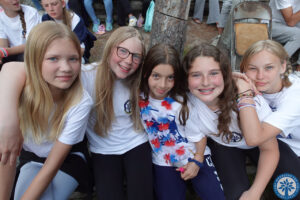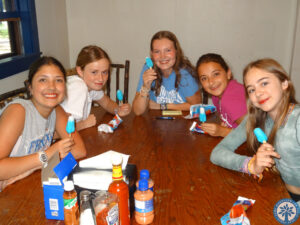Category: Why Camp Woodland?!
Game On: Real Over Robots at Camp
 It is conference season, and several of us have been traveling to meet other camp professionals in various locations for a chance to network and learn together. I happen to be someone who leads educational sessions at conferences, and while creating PowerPoint presentations for these opportunities, I found myself having the need to put a slide at the beginning that says, “This presentation was prepared for you by a real person.” Included with this is an image of “ChatGPT” with a giant “X” through it along with my bitmoji showing a fist in the air and the words, “Game On.” I then go on to challenge the people in the room to tell me at the end if they think that a robot could have put the presentation together to the same degree. Their response?! A resounding, “NO WAY!”
It is conference season, and several of us have been traveling to meet other camp professionals in various locations for a chance to network and learn together. I happen to be someone who leads educational sessions at conferences, and while creating PowerPoint presentations for these opportunities, I found myself having the need to put a slide at the beginning that says, “This presentation was prepared for you by a real person.” Included with this is an image of “ChatGPT” with a giant “X” through it along with my bitmoji showing a fist in the air and the words, “Game On.” I then go on to challenge the people in the room to tell me at the end if they think that a robot could have put the presentation together to the same degree. Their response?! A resounding, “NO WAY!”
 When people ask me what is it that do, my elevator “speech” is “I’m in the business of developing emerging leaders with the skills that robots can’t do.” It is super fun to see what kind of response this statement brings. It usually takes a moment for people to comprehend what I just said, and it is often accompanied by a quizzical look (the kind where someone stares off into space and is trying really hard to imagine what this looks like). This is in part because I didn’t answer with the typical, “I’m a camp consultant,” or “I do staff training for camps.” It is also in part because it may not be crystal clear what I do, but it sounds really cool. And, it generates a need for someone to want to know more!
When people ask me what is it that do, my elevator “speech” is “I’m in the business of developing emerging leaders with the skills that robots can’t do.” It is super fun to see what kind of response this statement brings. It usually takes a moment for people to comprehend what I just said, and it is often accompanied by a quizzical look (the kind where someone stares off into space and is trying really hard to imagine what this looks like). This is in part because I didn’t answer with the typical, “I’m a camp consultant,” or “I do staff training for camps.” It is also in part because it may not be crystal clear what I do, but it sounds really cool. And, it generates a need for someone to want to know more!
 Since I am a camp professional with a strong background in education, I can confidently say in my humble (and unbiased!) opinion that camp is hands down the BEST place for youth (ages 7-97) to learn and practice the people/life skills that will set them apart from the jobs that robots (AI) will and are already taking over. Not to say that schools don’t have their place; I just find that camp is better because of all the things that are missing in the summer camp experience that make room for opportunities to practice and learn the skills that are vital to us as people. This is largely in part because through subtraction at camp, we are able to employ addition. I realize this seems counterintuitive or even unlikely; however, camp is the perfect ecosystem for the skills robots can’t do to be nurtured and developed organically!
Since I am a camp professional with a strong background in education, I can confidently say in my humble (and unbiased!) opinion that camp is hands down the BEST place for youth (ages 7-97) to learn and practice the people/life skills that will set them apart from the jobs that robots (AI) will and are already taking over. Not to say that schools don’t have their place; I just find that camp is better because of all the things that are missing in the summer camp experience that make room for opportunities to practice and learn the skills that are vital to us as people. This is largely in part because through subtraction at camp, we are able to employ addition. I realize this seems counterintuitive or even unlikely; however, camp is the perfect ecosystem for the skills robots can’t do to be nurtured and developed organically!
According to Forbes, there are 10 skills that robots can’t replace in the workplace (May, 2022). LinkedIn has its own list of 7 crucial human skills that AI can’t replace (March, 2023). If we look at the crossover from these (and other) lists, it isn’t a stretch to make the connection to camp as being the place where critical thinking, creativity, emotional intelligence, and collaboration/teamwork (just to name a few!) are an integral thread of the fabric for this unique (and real!) experience that is hard to replicate anywhere else.
 By taking just one of Woodland’s traditional camp activities (I will use the annual Song Contest for illustration purposes), a line can be drawn to each of the skills mentioned above for both campers (and staff!). Song Contest is when cabin groups are tasked with changing the words to a popular song so that it tells a story about the current summer. The entire camp comes together on a Saturday evening to enjoy the highly anticipated performances of each individual cabin. There are special judges who have the honor of determining the “winner” and runners-up for this friendly, yet somewhat competitive (let’s be honest!), event.
By taking just one of Woodland’s traditional camp activities (I will use the annual Song Contest for illustration purposes), a line can be drawn to each of the skills mentioned above for both campers (and staff!). Song Contest is when cabin groups are tasked with changing the words to a popular song so that it tells a story about the current summer. The entire camp comes together on a Saturday evening to enjoy the highly anticipated performances of each individual cabin. There are special judges who have the honor of determining the “winner” and runners-up for this friendly, yet somewhat competitive (let’s be honest!), event.
 Critical thinking shows up as each group thinks on their feet to rewrite the words, choreograph dance moves, and choose costumes to match the theme of their chosen song. Emotional intelligence can be found in the interactions between the girls from each cabin group; it takes self-awareness to take notice and monitor one’s own emotions and it takes empathy to pay attention to the emotions and feelings of others. It wouldn’t be unusual for someone’s feelings to get hurt when their idea isn’t incorporated; it takes resolve for a camper to be OK with that and to also support the other person for their contribution to the group.
Critical thinking shows up as each group thinks on their feet to rewrite the words, choreograph dance moves, and choose costumes to match the theme of their chosen song. Emotional intelligence can be found in the interactions between the girls from each cabin group; it takes self-awareness to take notice and monitor one’s own emotions and it takes empathy to pay attention to the emotions and feelings of others. It wouldn’t be unusual for someone’s feelings to get hurt when their idea isn’t incorporated; it takes resolve for a camper to be OK with that and to also support the other person for their contribution to the group.
 Creativity is present from start to finish when taking on this challenge to put together an original entry for Song Contest. Imagination comes to life with the final performance! The week leading up to Song Contest is one giant exercise in teamwork and collaboration. Working together does not mean the absence of conflict; however, groups are able to move through and past any differences and disagreements in the spirit of having a unified effort towards a common goal.
Creativity is present from start to finish when taking on this challenge to put together an original entry for Song Contest. Imagination comes to life with the final performance! The week leading up to Song Contest is one giant exercise in teamwork and collaboration. Working together does not mean the absence of conflict; however, groups are able to move through and past any differences and disagreements in the spirit of having a unified effort towards a common goal.
This one example (and there are many more where this came from!) shows how camp fosters the development of REAL people skills in the normal day-to-day happenings that occur when immersed in an experience with peers when away from the typical distractions of home/school. So, when someone asks you why you send your child to camp, you can confidently say that you are giving your daughter the opportunity to develop the skills that robots can’t do! I’d love to know what response you get…you can email me at kimdaycock@gmail.com!
ENROLL for SUMMER 2024
Now is a GREAT time to enroll your camper/s for 2024 and reserve your spot/s to give your daughter/s the opportunity to develop REAL people skills. Sign up HERE: https://cwtp.campbrainregistration.com
It Starts by Making Your Bed Each Morning
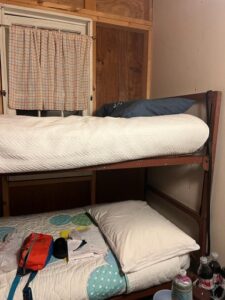 As I struggled to straighten the sheets, blankets and pillows on my bed this morning, I am reminded that one of the first things I do at camp each day is make my top bunk bed. I stand on the frame of the bottom bunk and wrangle the thick comforter (that is out of view at the foot of the bed in the photo below – gotta love the often chilly Northern Wisconsin summer nights!) and other bedding items into place. I then get dressed and place my PJ’s on my pillow so they are in position for my evening routine. Now I am truly ready to start my day!
As I struggled to straighten the sheets, blankets and pillows on my bed this morning, I am reminded that one of the first things I do at camp each day is make my top bunk bed. I stand on the frame of the bottom bunk and wrangle the thick comforter (that is out of view at the foot of the bed in the photo below – gotta love the often chilly Northern Wisconsin summer nights!) and other bedding items into place. I then get dressed and place my PJ’s on my pillow so they are in position for my evening routine. Now I am truly ready to start my day!
We often hear from parents in those first days/weeks after camp, that their camper/s is/are faithful about making her bed every morning, picking up clutter around the bedroom/house, brushing teeth, and pitching in with daily chores without batting an eye. My question is…is your camper still in the habit of doing those beginning of day routines?
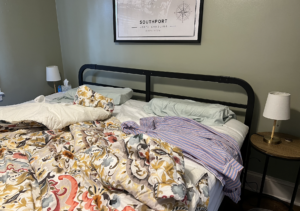 Truth be told, I can honestly say that I am not great about this particular ritual once I am home from camp. For one, there is a good chance that my husband is still sleeping when I get up (especially on weekends), so it is kind of hard to make a bed when someone is in it! Then I get busy with other routines: making coffee, assembling a yogurt parfait for my husband’s car ride to work, taking the dogs for a walk, exercising, etc. By the time I get through with all of that, I may straighten out the sheets a bit and take a quick pass at the top cover with a lint roller to remove the excess of dog hair, but that is about it. Many days, I completely forget about my unmade bed and jump into other tasks and projects (which usually does not include taking a shower!).
Truth be told, I can honestly say that I am not great about this particular ritual once I am home from camp. For one, there is a good chance that my husband is still sleeping when I get up (especially on weekends), so it is kind of hard to make a bed when someone is in it! Then I get busy with other routines: making coffee, assembling a yogurt parfait for my husband’s car ride to work, taking the dogs for a walk, exercising, etc. By the time I get through with all of that, I may straighten out the sheets a bit and take a quick pass at the top cover with a lint roller to remove the excess of dog hair, but that is about it. Many days, I completely forget about my unmade bed and jump into other tasks and projects (which usually does not include taking a shower!).
 In listening recently to part of a commencement speech given by Navy Seal Admiral William H. McRaven and reading the first chapter of his book “Make Your Bed,” I am rethinking the importance of what often seems at surface level to be a very mundane and insubstantial task. McRaven even goes so far to say, “If you want to change the world, start off by making your bed.” Wow, what?! How does making my bed help me change the world? Explanation, please! As you may know, Navy SEAL training is some of the toughest training around, both physically and mentally. Each day starts with an inspection of the uniform and bed by an instructor with a critical eye for neatness and perfection.
In listening recently to part of a commencement speech given by Navy Seal Admiral William H. McRaven and reading the first chapter of his book “Make Your Bed,” I am rethinking the importance of what often seems at surface level to be a very mundane and insubstantial task. McRaven even goes so far to say, “If you want to change the world, start off by making your bed.” Wow, what?! How does making my bed help me change the world? Explanation, please! As you may know, Navy SEAL training is some of the toughest training around, both physically and mentally. Each day starts with an inspection of the uniform and bed by an instructor with a critical eye for neatness and perfection.
McRaven actually didn’t mind the simple task of making his bed while in the Navy – he came to appreciate that it was the one constant he could count on every day. It was the one thing he knew he could do without fail. And, he could do it well. It was something to be proud of. Being the first of many tasks in a given 24 hours, sometimes success can be measured just by completing something (even if it is small). If one task is completed, then follows another and another. Next thing you know, a whole string of tasks have been executed, and from that comes a sense of pride and accomplishment. Sometimes in a world where there is little control, making your bed IS the one sure thing in your control. Why not begin each day with a win?!
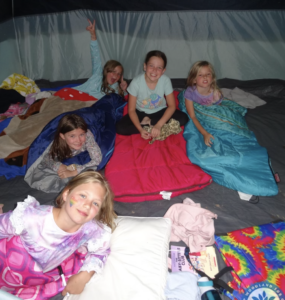 All campers and staff start the day by making their bed (and why snuggling up in a sleeping bag is a fun change of pace on a canoe overnight adventure as you see in the photos). It is even part of the “scoring” for when the nurse and CIT on duty come around to “inspect” cabins. Having a neat bed may be the difference in earning a pizza party or trip to Cathy’s for being the cabin with the high “score” at the end of each week. Making your bed is the beginning of many opportunities to be successful throughout the camp day. From there it might be that a bullseye is hit in archery, a horse can be approached without being nervous, a mooring is made in sailing, a new food is tried at lunch, water-skiing is attempted during Rec Swim, and participating in skit at campfire becomes fun (and not dreaded).
All campers and staff start the day by making their bed (and why snuggling up in a sleeping bag is a fun change of pace on a canoe overnight adventure as you see in the photos). It is even part of the “scoring” for when the nurse and CIT on duty come around to “inspect” cabins. Having a neat bed may be the difference in earning a pizza party or trip to Cathy’s for being the cabin with the high “score” at the end of each week. Making your bed is the beginning of many opportunities to be successful throughout the camp day. From there it might be that a bullseye is hit in archery, a horse can be approached without being nervous, a mooring is made in sailing, a new food is tried at lunch, water-skiing is attempted during Rec Swim, and participating in skit at campfire becomes fun (and not dreaded).
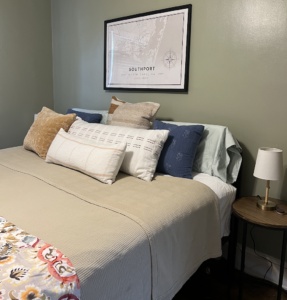 Being away from camp at this moment in time, what if we get back to the routine of starting the day off with a simple, yet achievable task? The mere act of making the bed can then lead to turning in homework on time, asking a question in class, sitting by someone outside a friend group in the cafeteria, feeling confident before a quiz or test, finishing a report a few days before it is due, complimenting someone on their effort on the field or court, and so much more.
Being away from camp at this moment in time, what if we get back to the routine of starting the day off with a simple, yet achievable task? The mere act of making the bed can then lead to turning in homework on time, asking a question in class, sitting by someone outside a friend group in the cafeteria, feeling confident before a quiz or test, finishing a report a few days before it is due, complimenting someone on their effort on the field or court, and so much more.
I know I’m going to work at doing better to make MY bed each morning. A win in the first 5 minutes of the day sounds like a no-brainer! Will you and your camper/s join me? It might just be a little thing that turns into some BIGGER things that change how things go in life AND in the world.
Campers Share What They Learned This Summer
 I think it is safe to say that our campers have made their “back to school” debut for the 2023-24 year. Backpacks filled with a beach towel, sweatshirt, tennis raquet and riding boots from the summer have been traded in for one that carries lunch, completed homework, a calculator, and a binder or two. It is exciting to dive into the topics that each grade will explore for the new school year. Let the learning begin!
I think it is safe to say that our campers have made their “back to school” debut for the 2023-24 year. Backpacks filled with a beach towel, sweatshirt, tennis raquet and riding boots from the summer have been traded in for one that carries lunch, completed homework, a calculator, and a binder or two. It is exciting to dive into the topics that each grade will explore for the new school year. Let the learning begin!
So often, we hear about the learning loss that occurs during the summer from having too much time away from school. As a teacher who has spent 35+ summers at camp, I would like to propose that children who go to summer camp, actually experience just the opposite. Kids who spend their summer at camp have a learning surplus. While I do not have any scientific data to back this claim, I can share with you what your campers reported learning during the recent summer. Based on the wording of the question that was asked, their responses are (mostly) activity based; however, there are a few campers who recognized other kinds of learning that occurred in the Soaring Free in ’23 summer. Campers also shared the camp activities they wish they could do at home – it is interesting to see the differences in the “favorites” from cabin to cabin.
Audrey: the point system and how to shoot in archery; Amelia: how to capsize and new strokes in canoeing; Evie: a lot about bugs and insects; Jaclyn: how to hold the reins and control your horse in riding; Eleanor: how to trot; JoJo: how to post when trotting; Luci: to make cool stuff in arts & crafts like fairy houses; Georgia: parts of the boat in sailing; Fiona: how to trot in riding; Oli: doing a split front walkover and aerial in gymnastics
Activities we wish we could do at home: Drama, Archery (3), Riding (4), Farm Zoo (2), Sailing, Rec Swim
Silver Birch
Alice: how to shoot a bow and arrow; Elyse: riding a horse; Clara: trotting in riding; Masyn: a front hand spring and aerial in gymnastics; Lia: how to set up a boat for sailing; Mojo: a back bend in gymnastics and emergency dismount in riding; Roberta: playing rollout in tennis; Ana Roberta: painting; Maya (CIT): passing my expert!
Activities we wish we could do at home: Farm Zoo, Riding, Riflery (2), Sailing (2), All of them!, Gymnastics,
Eloise: tie a slip on figure 8 knot; Maggie: a handstand into a bridge in gymnastics; Olivia H: trot and do my own stirrups in riding; Casilda: the parts of an X-boat and how to tack in sailing; I love my counselors and cabin; I love tennis and sailing; Renata: new strokes in swimming; Camila: shooting a gun in riflery; Dani (CIT): patience, parts of the boat, hard terminology, theories, committee rules, how to use a spinnaker in sailing
Activities we wish we could do at home: Riding, Rec Swim (2), Riflery (3), Tennis, Sailing,
Driftwood
Hannah: making flowers in Arts & Crafts; Orla: how to dive!; Maddie H: make a basket; Amelia: literaly everything in sailing!; Maddie B: the rhythm of posting in riding; Nat (CIT): how to shoot from a sitting position and score targets in riflery
Activities we wish we could do at home: Tennis, Riflery, Archery (3), Swim lessons, Canoeing,
Julia: rules of doubles matches in tennis; Regi: improving my strokes in swimming; Natalia: perfecting the details of my strokes in swimming; Olive: how to sail and capsize; Sophia: parts of boat, points of wind, how to heel and race in sailing; Casi: a handstand to a bridge in gymnastics; Taylor: I didn’t know how to sail before; Tess (CIT): how to handle horses that are acting out and train new horses
Activities we wish we could do at home: Arts & Crafts, Riflery, Riding (5), Sailing, Water-skiing/All of them!
Zoe: tips to stay steady when shooting in riflery; Alix: squeeze legs in riding; Stella: caring for the animals in Farm Zoo and how to shoot a gun; Amelia: how to serve in tennis; Phoebe: how to do the “gooseneck”, and set up and take down the main sail and jib in sailing; Clara: to just enjoy where you are at the moment!; Olivia: how to shoot in riflery; Sydney: passing levels in tennis; Isabella (CIT): working on sail boats and directing a drama show
Activities we wish we could do at home: Riflery (6), Farm Zoo, Water-skiing, Archery (2), Sailing
Vale: how to do a proper start in sail race; Marion: making fudgy cherry pies in canoeing; Lizzie: how to do strokes accurately in swimming; Bella: serving in tennis and points of sail; Izzy: how to canter in riding; Elizabeth: where my sail should be based on various conditions/points of sail; Katherine: how to handle a misbehaving horse and parts of a horse
Activities we wish we could do at home: Riflery, Tennis, Sailing (3), Water-skiing, Archery
Aquarius
Sofia: how to ride properly; Delia: I learned A LOT in sailing; Lou: planning/strategizing a race in sailing before I actually do it; Lizzy: the rules of tennis; Lizzie: making flowers in Arts & Crafts; Kaitlyn: to keep the string on the bow pulled back by my ear in archery; Lilah: don’t fall off a horse!
 Activities we wish we could do at home: Archery (3), Riding, Sailing (2), Riflery (2), Canoeing
Activities we wish we could do at home: Archery (3), Riding, Sailing (2), Riflery (2), Canoeing
As you can see, there is no such thing as learning loss while spending an amazing summer at camp! The typical day at camp is packed with learning experiences that are EVEN BETTER than a typical day at school. And that is coming straight from the keyboard of a math teacher!!!
ENROLL for SUMMER 2024
To continue the learning curve during the summer months, now is a GREAT time to enroll your camper/s for 2024 and reserve your spot/s. Sign up HERE: https://cwtp.campbrainregistration.com
Parents and Campers Share “Soaring Free” Moments
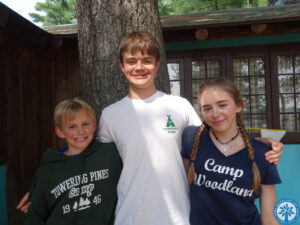 A BIG thank you to our camp families for taking the time respond to our end-of-season survey and giving valuable feedback about the recent summer so that we can continue to improve as we make plans for 2024. Our theme this summer was “Soaring Free in ’23,” and from the comments we received from parents about the transformations being noticed at home after spending time with us, it obvious that your camper/s soared quite high!
A BIG thank you to our camp families for taking the time respond to our end-of-season survey and giving valuable feedback about the recent summer so that we can continue to improve as we make plans for 2024. Our theme this summer was “Soaring Free in ’23,” and from the comments we received from parents about the transformations being noticed at home after spending time with us, it obvious that your camper/s soared quite high!
PARENT PERSPECTIVE
 Because our survey responses come together for both Woodland and Towering Pines, and many camp families have children at both, they are co-mingled here:
Because our survey responses come together for both Woodland and Towering Pines, and many camp families have children at both, they are co-mingled here:
Our daughter has become more adventurous with her food choices which is great! They are both learning to be more independent and try new things.
As every summer, the kids have come home more independent and mature. This year, they also seem closer to each other since they were both in coed show and got to share that experience.
Our son seems a lot more mature; we can tell that he’s gained life perspective and is not as addicted to devices which is great. He’s been much more talkative with all of us and he’s gained significant skills in meeting new people on his own and talking with them.
**I see them more talkative and they both seem really happy with their experiences. **Maturing and willingness to work hard on goals. **More confident, social, self confident, mature. Growth. ** Both kids are more capable, independent, and embracing of challenges. Also, they seem to have a more mature attitude about life. ** Confident (!) and able to walk into situations with unknown kids/adults and not feel overwhelmed! **
 ** Independence in our daughter. Compassion and inclusion in our son. **Increased confidence, independence, and adventurousness. ** Increased confidence, trying new things. ** More confidence around tennis. ** She is now officially a camp kid! Loved it! **Self esteem, open to try new things. ** He’s become more active and is eating better. **
** Independence in our daughter. Compassion and inclusion in our son. **Increased confidence, independence, and adventurousness. ** Increased confidence, trying new things. ** More confidence around tennis. ** She is now officially a camp kid! Loved it! **Self esteem, open to try new things. ** He’s become more active and is eating better. **
** Better sense of self. ** She is more of a leader and doing things outside her comfort level. ** He is more confident, has more independence, smiles more and more often. ** I can see that he is more open, he gained self confidence, and made new friends. ** Confident, healthy, happy, and I can’t wait for her to go back so she gets a break from her phone obsession (ha!). **
CAMPER PERSPECTIVE
Towards the end of camp, each girl had the opportunity to share her thoughts on what “soaring free in ’23” looked like (all campers whose form we received are included here):
Audrey: trying new things and making new friends, being a good friend; Amelia: making new friends that are different from me; Evie: meeting new friends, fun; Jaclyn: trying new things and being myself; Eleanor: trying really hard in all of my activities; JoJo: having a lot of fun with all of my friends at camp; Luci: trying new things; Georgia: trying new things and being kind and open to everybody; Fiona: having fun at camp with new activities; Oli: trying oatmeal and new activities
Silver Birch
Alice: first time going to a sleep away camp that I really liked and felt like I grew at; Elyse: trying new foods and activities, making new friends; Clara: being myself and having fun (and MUCH, MUCH MORE!); Masyn: in the breeze was an eagle so kind and he helped me find this place; Lia: having fun and being myself; Mojo: learning space; Roberta: nice, welcoming, happy; Ana Roberta: mi verano esta muy paque y escanlar; Maya (CIT): trying my best
Eloise: a girl trying new things; Maggie: I tried kneeboarding; Olivia H: trying new things; Casilda: I tried riflery and archery, and I also really like dance; I love my counselors and cabin; I love tennis and sailing; Renata: fun and awesome; Camila: being at camp; Dani (CIT): amazing – I made a lot of good friends, and I want to keep in touch with them…it was a break from home
Driftwood
Hannah: great!; Orla: fun and free to be me; Maddie H: trying new things and achieving stuff in 2023; Amelia: passing up to my blue archer; Maddie B: trying new things; Nat (CIT): enjoyable, fun, new
Hilltop
Julia: fun, trying new things and being friends with new people; Regi: wonderful, new chances and a lot of fun!; Natalia: fun, unforgettable and joyful; Olive: meeting new people and doing things I would never do; Sophia: being yourself without being judged, being able to be who you are, brave, confident; Casi: a really fun summer that I loved a lot; Taylor: learning new things and starting new beginnings; Tess (CIT): enjoying my activities for the activity and not the level
Zoe: it was great, and I progressed so much; Alix: learning a lot in riding; Stella: being my most authentic self and finding activities that make me happy!; Amelia: experiencing new things, making new friends and starting new beginnings; Phoebe: being myself and being brave; Clara: fun, loving, and super filled with friends; Olivia: learning how to shoot in riflery; Sydney: passing levels; Isabella (CIT): being myself and having fun
Treetops
Vale: a great year with all my friends while enjoying the activities that I love to do the most; Marion: fun, friendly, free, amazing; Lizzie: having soooooo much fun; Bella: getting to meet new people and trying new things; Izzy: doing the activities that I like and having a great cabin; Elizabeth: one of the best years ever!; Katherine: just living life with amazing friends and things to do without stress or anxiety
Sofia: a great opportunity to try something new; Delia: being on the water and enjoying sailing; Lou: learning a ton in sail race; Lizzy: having fun; Lizzie: being open to others sharing feelings and being free in spirit; Kaitlyn: hanging out with friends and learning how to be a good CIT; Lilah: having fun and slaying every day
ENROLL for SUMMER 2024
While feelings are at an all time high from the summer, now is a GREAT time to enroll your camper/s for 2024 and reserve your spot/s before we open registration for new campers. The early bird discount ($750 deposit, 5% off 2024 rate) for all returning campers has been extended through 9/8/23 when registering for 6 weeks: https://cwtp.campbrainregistration.com
Camp is a Place to Find Your People
The song, “Find Your People” by Drew Holcomb and the Neighbors caught my attention recently, so I decided to look up the lyrics. Now I know why it came across my radar. The song speaks to the camp community that is created every summer at Camp Woodland; 2023 being no exception. Now that your family has been reunited, this may give a peek into the window of what your camper/s experienced over the course of 6 weeks.
The ones that make you feel alright
The kind you want to stay up with all night
You got to find your people
The ones that make you feel whole
That won’t leave your side when you lose control
The ones that don’t lose your soul
The ones that get the joke
Who understand what you’re saying before a word is spoke
You gotta find your people
That put the needle in the groove
When you’re together, you got nothing to prove
When you’re together, you got nothing to lose
In a world of strangers, you don’t know who to trust
All you see is danger, trying to find what you lost
You can’t go in alone, everybody needs help
You gotta find your people, then you’ll find yourself
You gotta find your people
That’ll call your bluff
Who’ll ride along when the road is rough
You gotta find your people
The ones that you feel equal
They pick you up and don’t put you down
Help you find your way in the lost and found
In a world of strangers, you don’t know who to trust
All you see is danger, trying to find what you lost
You can’t go in alone, everybody needs help
You gotta find your people, then you’ll find yourself
The ones that understand you
The ones that lend a hand to you
The ones that don’t demand anything from you
You gotta find your people
The ones that make you feel alright
That tell you the truth then wish you well
You gotta find your people, then you’ll find yourself
You gotta find your people, then you’ll find yourself
After spending 6 weeks in the camp ecosystem, these girls have “found their people”. Now that your camper/s are back at home and making their way into the world again, our hope is that they are able to stay true to themselves and “find their people” at school, in sports and activities, at work, and with their friend groups. This song is a yardstick for measuring the true depth of friendships. Do those friends make her feel alright? Make her whole? Will they leave her side or ride along when the road is tough?
Will she falter? Absolutely. Will she make poor choices? Most likely. Will she need gentle reminders? Of course. That’s our job as adults. We guide and support them on the path to “finding their people”.
I think it is safe to say that each camper who spent the summer with us knows a little more about herself as a result of the people she spent time with. We hope this will last the next 9 months or so until she can be back in the Northwoods at Camp Woodland with “her people” and that you will reserve her spot for 2024 (early bird discount through 8/31/23 when registering for 6 weeks): https://cwtp.campbrainregistration.com









